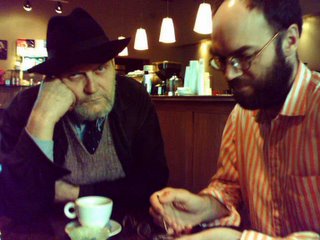
ONCE IN A WHILE a cookbook appears that just can’t seem to go wrong. Judy Rodgers’s Zuni Café Cookbook is one example: when it arrived I almost immediately made a Caesar Salad following the recipe, and the result tasted exactly like being in the Zuni Café. A few weeks later, same experience with her marvelous roast chicken.
The latest example is Suzanne Goin’s Sunday Suppers at Lucques, published last month, I believe. Suzanne worked a stint at Chez Panisse, is how we know her; then she moved on, first to the sous-chef role at Mark Peel’s Campanile in Los Angeles, then opening her own restaurants — first Lucques, later AOC.
We’ve only had time to try one recipe so far: we’ve been away. A couple of days ago Lindsey decided to try Suzanne’s Pappardelle with wild mushrooms, shell beans, and parmesan, making so many substitutions you’d be excused for thinking it was an entirely different dish. Farfalle instead of pappardelle; a mix of storebought mushrooms; lima beans instead of fresh shell beans — that sort of thing.
But the result was absolutely delicious. And better than that: it was intriguing, interesting, substantial. Everyone commented on it, from twelve-year-old Fran (as fine a bouche as any in this family) to seventy-year-old me. And delicious as the thing was the night Lindsey made it, it only got better the next day, when it was served warmed over in the skillet you see here.
It tasted of Suzanne’s restaurant Lucques, which — like Loretta Keller’s Bizou of fond memory — seems at its best in slow-cooked dishes — braises and the like. There’s something special about dishes like these, comforting of course this time of year, but beyond even that there’s something really interesting — their complexity and depth suggest something chthonic and primordial.
In this case, as Giovanna pointed out, there are so many details. Textures, colors, tastes. And each forkful brings a quantity of physical interfaces far beyond what you’d expect: the tiny morsels of bean, pasta, mushroom, spinach, parmesan, breadcrumbs have so much texture; so many wrinkles, edges, folds, grains; each of them immediately finding a receptor on the tongue, then moving on to dozens more.
It’s a complex recipe, but not a daunting one, I think — I say complacently, as I had nothing to do with making it. But it is a delicious thing, and a glass of Nero d’Avila does not hurt it.
